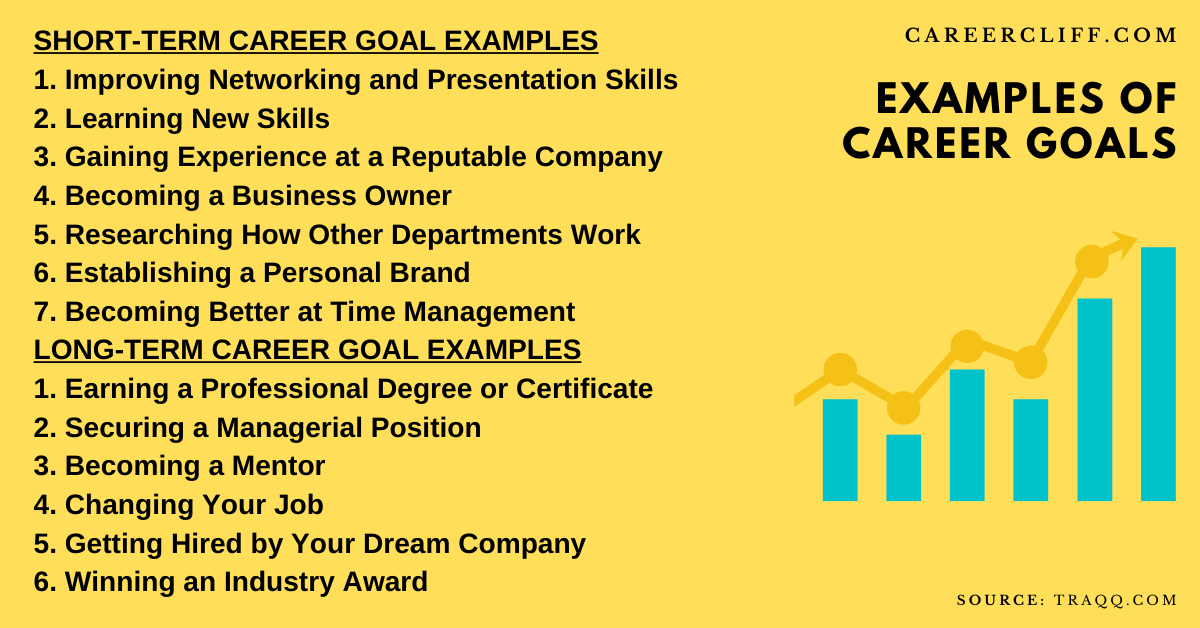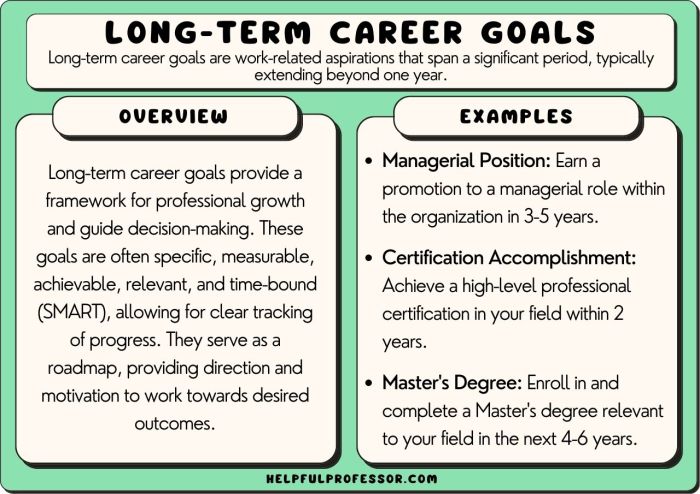Career Development Goals are the key to unlocking your professional potential and achieving success in your chosen field. Whether you’re aiming for a promotion, honing specific skills, or charting a long-term career path, setting clear goals can pave the way for growth and fulfillment. Let’s dive into the world of career development goals and explore how they can shape your future.
Importance of Career Development Goals

Setting career development goals is essential for professional growth as it provides a clear direction and focus for individuals to work towards. Without clear goals, it can be challenging to measure progress and stay motivated in one’s career journey.
Clarity and Focus
- Clear career goals help individuals identify their strengths and weaknesses, allowing them to focus on areas that need improvement.
- Having specific goals in mind can also help individuals make informed decisions about their career path and avoid feeling lost or uncertain about their future.
Motivation and Progress Tracking, Career Development Goals
- Setting career goals provides a sense of purpose and motivation, driving individuals to strive for success and overcome obstacles along the way.
- By establishing measurable goals, individuals can track their progress and celebrate achievements, boosting confidence and morale in their professional journey.
Professional Growth and Success
- Well-defined career development goals can lead to success in a chosen field by guiding individuals towards relevant opportunities for growth and advancement.
- Individuals who actively pursue their career goals are more likely to stay engaged, motivated, and satisfied in their work, ultimately leading to a fulfilling and successful career.
Types of Career Development Goals
When it comes to setting career development goals, there are various types that individuals can focus on. These goals can range from skill-based objectives to performance-based targets, as well as advancement-based aspirations. It is crucial to have a mix of short-term and long-term goals to ensure continuous growth and progress in one’s career.
Skill-Based Goals
Skill-based goals focus on developing specific abilities or competencies that are essential for success in a particular field or role. These goals often involve acquiring new skills, improving existing ones, or gaining certifications to enhance one’s professional skill set.
Performance-Based Goals
Performance-based goals are centered around achieving specific outcomes or results within a set timeframe. These goals are often tied to metrics or key performance indicators (KPIs) that measure an individual’s effectiveness and contribution to the organization.
Advancement-Based Goals
Advancement-based goals involve setting targets for career progression and growth within a company or industry. These goals may include seeking promotions, taking on leadership roles, or transitioning to a higher position with increased responsibilities and opportunities.
Importance of Short-Term and Long-Term Goals
Setting both short-term and long-term career goals is essential for maintaining focus, motivation, and direction in one’s professional journey. Short-term goals provide immediate targets to work towards, while long-term goals offer a broader vision and roadmap for future success.
Short-Term Goals
- Short-term goals help individuals stay on track and make incremental progress towards their larger objectives.
- They provide a sense of accomplishment and motivation as smaller milestones are achieved.
- Short-term goals allow for adjustments and course corrections based on evolving circumstances or priorities.
Long-Term Goals
- Long-term goals provide a clear sense of direction and purpose, guiding decisions and actions in the present.
- They help individuals envision their desired future and plan strategically to reach their ultimate career aspirations.
- Long-term goals foster resilience and perseverance, especially during challenging times or setbacks.
- Example 1: Increase sales revenue by 10% within the next quarter by implementing a new marketing strategy.
- Example 2: Earn a professional certification in project management within six months to enhance job prospects and qualifications.
- Example 3: Lead a cross-functional team on a major project and deliver results within the established timeline and budget constraints.
- Set SMART goals: Make sure your goals are Specific, Measurable, Achievable, Relevant, and Time-bound to keep you on track.
- Break it down: Divide your goals into smaller tasks or milestones to make them more manageable and celebrate each achievement along the way.
- Stay organized: Create a timeline or to-do list to prioritize tasks and track your progress towards your career goals.
- Seek support: Surround yourself with mentors, colleagues, or friends who can provide guidance, encouragement, and feedback to help you stay motivated.
- Visualize success: Imagine yourself achieving your career goals and the impact it will have on your life to maintain focus and drive towards success.
- Financial constraints can be overcome by seeking scholarships, grants, or financial aid options.
- Limited access to education or training can be addressed by exploring online courses, workshops, or vocational programs.
- A lack of mentorship or guidance can be resolved by networking and seeking advice from professionals in the field.
- Seeking feedback and learning from failures can help individuals grow and improve their skills.
- Creating a support system of friends, family, or mentors can provide encouragement and guidance during challenging times.
- Setting smaller, achievable milestones along the way can help individuals stay motivated and track their progress.
Examples of SMART Goals

SMART goals are specific, measurable, achievable, relevant, and time-bound objectives that are commonly used in career development planning. These goals are designed to be clear, actionable, and realistic, ensuring that individuals can track their progress and stay accountable for their professional growth.
Strategies for Setting and Achieving Career Development Goals
Setting and achieving career development goals requires a clear plan and dedication. Here are some strategies to help you along the way.
Role of Self-Assessment in Identifying Suitable Career Goals
Self-assessment plays a crucial role in identifying suitable career goals. By evaluating your skills, interests, values, and personality traits, you can determine what career paths align with your strengths and passions. Take the time to reflect on what truly motivates you and what you excel at to set meaningful and achievable goals.
Tips on How to Stay Motivated and Focused
Overcoming Challenges in Career Development Goal Achievement
When it comes to achieving career development goals, individuals often face various obstacles that can hinder their progress. It is essential to understand these challenges and have strategies in place to overcome setbacks and stay resilient in pursuing career aspirations.
Common Obstacles in Achieving Career Development Goals
One common obstacle individuals face is the lack of resources or support to help them reach their goals. This could include financial constraints, limited access to education or training, or a lack of mentorship or guidance.
Strategies for Overcoming Setbacks
Setbacks are inevitable on the journey to achieving career goals, but it is crucial to have strategies in place to overcome them and stay motivated. One effective strategy is to maintain a positive mindset and focus on the long-term vision of success.
Importance of Adaptability and Flexibility
Adaptability and flexibility are key traits when faced with unexpected challenges in goal achievement. Being able to adjust to changing circumstances and pivot when necessary can help individuals navigate obstacles and continue moving forward in their career development journey.
Remember, success is not always a straight path – it’s okay to take detours and make adjustments along the way.

